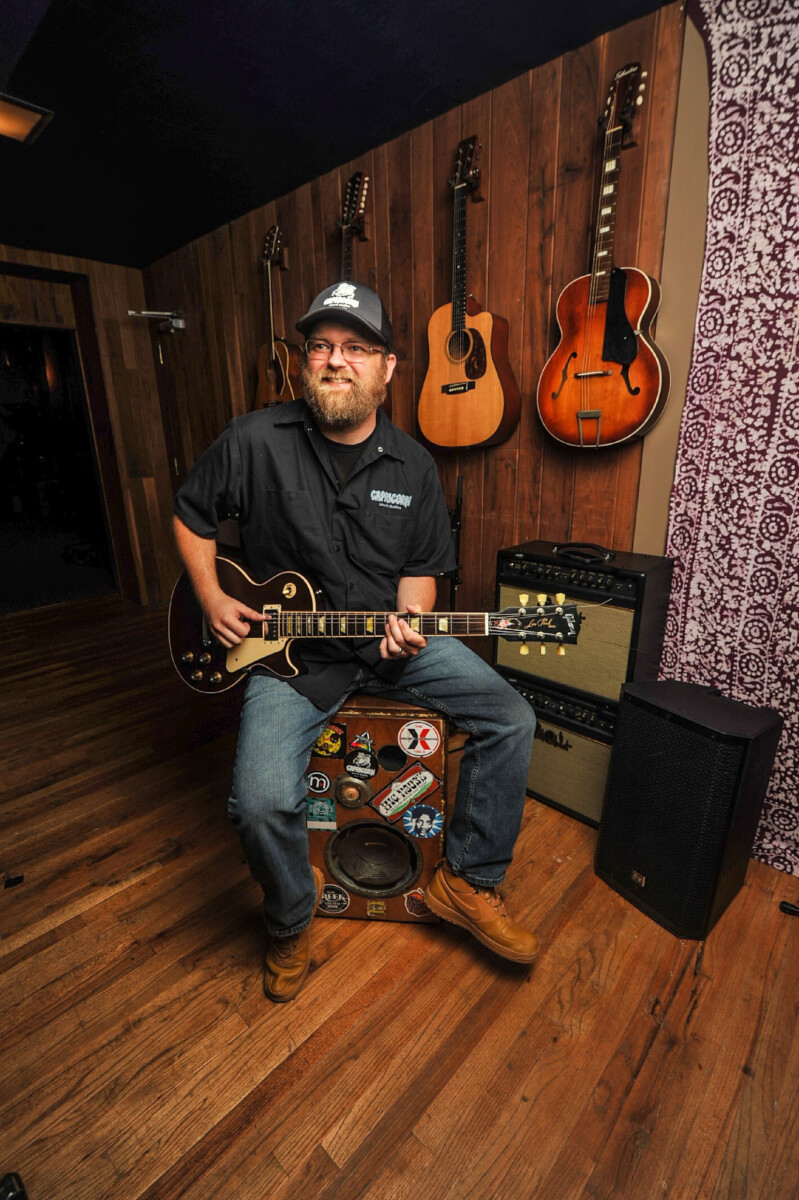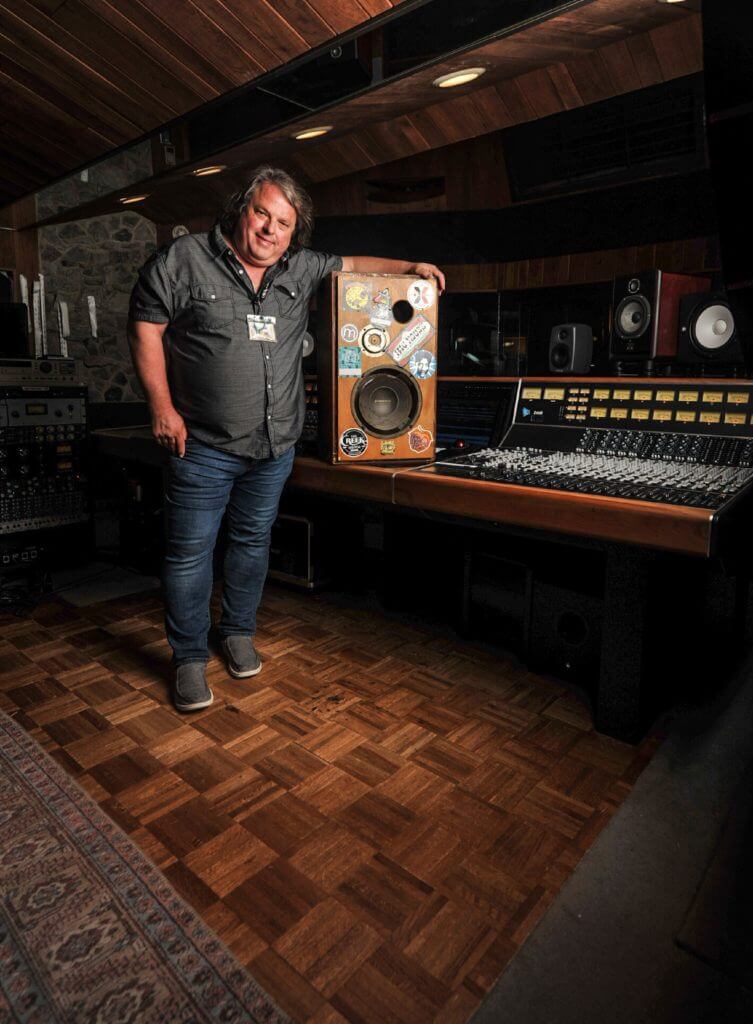By Michael W. Pannell
Macon wasn’t just home to a record label of musical greats. Macon was the place for greats who innovated a new sound of American music. Now, as that sense of place rises again, Capricorn makes a comeback, with sound studios in full operation and a museum to capture the continuing story.
With the experience and technical expertise Rob Evans has as chief engineer at Macon’s Capricorn Sound Studios, he still relies on terms like “energy,” “mojo” and “burlap and board” to describe the historic studio’s virtues.
No wonder.
Back in the day – the 1970s – luminaries like the Allman Brothers, Cowboy, Marshall Tucker, Wet Willie, Charlie Daniels and hosts of others made magic there and sent it on vinyl to the world. It made Southern Rock “a thing,” expanded other genres and, musically, put Macon on the map. Again.
Unfortunately, by the 1990s, the building was in shambles, and its future looked worse. But in 2015, saving grace came down: A partnership headed by Mercer University came up with $4 million to refurbish the studio and expand it to include a museum, rentable office and music incubator spaces.
But if they built it, would musicians and others come?
And would the magic still be there?
CAPRICORN STUDIO
The studio opened with fanfare in late 2019, and Evans said the answer has been a clear yes.
And that’s despite COVID-19.
Musicians, especially actively touring ones, suffered as the pandemic began, but a modern Southern rock act came to make music nonetheless. Evans, who oversees the entire Mercer Music at Capricorn complex, said Blackberry Smoke came to record “Live from Capricorn Sound Studios.” Fittingly, it features covers of Allman Brothers, Wet Willie and Marshall Tucker tunes with some of Macon’s son, Little Richard, thrown in.
Were the walls glad to hear old tunes performed with fire? Were they relieved that Evans and others made the space as original-like as possible?
Though Blackberry Smoke was the first well-known band to record in the studio, they weren’t the first.
“The Hughes Taylor Band was the first working band here,” Evans said. “We recorded something earlier for the grand opening, but Hughes was the first to do a real session. He’s a young guitarist from Macon and thrived on recording where his heroes did.”
So the mojo is there. “Beyond surreal” was how Taylor described it.
“The energy is so positive, and Capricorn was known for a great live sound,” Evans said. “It still has it. But it’s important people know it’s not just a Southern Rock studio. Some come and cry when they get in that room; others don’t have a clue of the history. They just know it’s a great place.”
It’s great in part due to “burlap and board.” Burlap refers to the space’s sound quality – most original baffles are still there – and board to the custom-made, 40-channel API sound console.
Evans stressed that combination has Capricorn equipped for all new eras of music – classical, jazz, opera, hip hop and the other genres.
“Our arms are wide open,” he said. “We’ve had a national reach bringing people in, but with modern capabilities, we’ve worked with players physically located across the world. Chuck Leavell did keyboard tracks here for a project Richard Ashcroft (formerly of The Verve) recorded at Abbey Road studios in London.”
At Capricorn in its early years, Leavell remained in Central Georgia and is an in-demand studio musician, bandleader, early member of the Allman Brothers and is the Rolling Stones’ keyboardist and musical director. He’s in the studio a lot, recently recording keyboards for theme music for The World Games to mix with tracks from elsewhere.
Tommy Talton is another Capricorn original who’s used the studio, most recently recording new songs to add to an anthology of his music. Talton co-founded Capricorn band Cowboy and was part of the studio’s house band, plus he played guitar on Greg Allman’s first solo tour.
Of the magic and mojo, he said it’s “definitely there.”
CAPRICORN MUSEUM
“There’s a strong feeling of the heavy events that went down in that building,” Talton said. “It’s hard for me to separate my memories of five years there with close friends from what visitors might feel is still hanging in the air, but yeah, I still feel the mojo.”
And that mojo isn’t just felt by those who record there. Outside Capricorn’s two studios is the building’s lobby-gift shop leading to the museum, open Wednesday through Sundays. It’s here, when he’s not working in the studio, you’ll often find Bob Konrad.
Konrad’s key role is museum director.
“There’s a lot that draws people here,” he said. “Music tourism is especially important in Macon because we have so much to hang our hat on. It’s important economically, and it’s important my generation tell the story to coming generations. People visit from all over.”
Even with a global pandemic altering the world just three months after opening, the Capricorn Museum has welcomed visitors from 42 states and 13 foreign countries.
At the core of the museum are memorabilia and “digital record bins” where guests can listen to most music released by Capricorn Records. From experience, Konrad said there are 600-plus hours to hear.
Despite the technology, Konrad said stories among guests are often at the heart of visitors’ experiences.
“The fun part is seeing people’s reactions,” he said. “There are always new stories to hear and tell. At the same time, we freely recommend people take in other spots like the Big House Museum, the H&H, Grant’s Lounge and Rose Hill Cemetery. They’re all part of the story.”
In the building’s southern end are rentable offices housing organizations like Macon Pops, the Macon Film Festival and Rock Candy Tours, among others. There are well-equipped conference rooms and rentable seating at tables in a common space with office equipment at hand.
Nearby are two floors of rooms where bands and artists can rehearse, write music or otherwise “incubate.”
Finally, there are the Mercer students who come for Evans’s capable tutelage.
“We’re teaching studio technology. This is the first year,” Evans said. “We show them things, let them do stuff, make mistakes, and before you know it, they know the right button to push. I’m amazed what they can do.”
Other students are involved as well, like those from the McDuffie Center for Strings who’ve worked on numerous recording projects.
KEEPING THE MOJO GOING
“I think of what’s happened here, what it means, and think that without Mercer and its funding partners, this would be a parking lot,” Evans said. “Mercer was the tip of the spear. Foundations and big contributors followed, but all the small contributors are important, too. It means something, knowing what this place means to people. We needed to keep the mojo going.”
As you enter the studio space, the Peyton Anderson Foundation is proudly displayed over the double doors. That’s because the Foundation was among those partners who knew Macon needed this “mojo” just as much as the studio needed saving. In fact, the Foundation assisted in the building’s acquisition when there was a threat of turning it into a parking lot in the early 2000s.
“The Capricorn Studios project was more than a mission-related investment when it comes to Macon and our music heritage,” said Karen Lambert, president of the Peyton Anderson Foundation. “It’s place-making in its truest form – using history, and an incredible soundtrack of that history, to leverage our current music scene, cultural tourism and a vibrant downtown. This is a place for our visitors, residents, artists and artists to come. Coming together to bring back Capricorn was a tipping point for our community.”
To find out more about Mercer Music at Capricorn and available tours, operating hours, rentals and recording opportunities, visit capricorn.mercer.edu.



